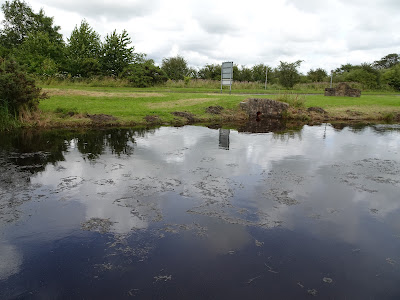Hard to pick a winner from Friday's bag full of sightings at Conder Pool. A female Yellow Wagtail I found in the morning was looking good to take first place, but a Hobby seen later on my second visit to the pool, won by a small margin over the wagtail.
The Falco subbuteo came on the scene and zipped over the pool, putting every bird in sight to the wing, including at least 900 Redshank which were roosting with 20 Greenshank, and a Spotted Redshank.
My attempt to get some decent footage of the Spotted Redshank was in vain. Too far off, and in poor light. But good to see some behavior of the Common Terns, and the Little Egret in the background.
Other waders mixed with the shank's, a male Ruff, 75 Lapwing, 3 Black-tailed Godwit, 2 Common Sandpiper, 2 Dunlin, and a Snipe. When things settled down after the Hobby panic attack, I found 5 Little Ringed Plover which were seen as an adult with 4 juvenile, certainly not the Conder Pool birds, I would guess from somewhere on the Lune Estuary, Aldcliffe perhaps?
I made no attempt to count the Conder Pool Common Tern population, but noted fledged young and counted 5 chicks on the platform. At least 2 Linnet and a Stock Dove seen. A Red Admiral was the only butterfly seen during the time spent at Conder Green and Glasson Dock where 2 Raven were over the estuary. Two Emperor Dragonfly were seen from the canal towpath.
Saltcote Pond.
A visit to Saltcote Pond had me find the result of some bad management. All the pondside vegetation had been taken out, and the edges trimmed like a bowling green in 'Keep Britain Tidy' style. In performing this mis-management, they will have excluded a number of aquatic creatures and dragonflies from using this excellent little pond which hosted a Ruddy Darter, found by Martin Jump on 20 July last year. The Ruddy Darter is one of the rarest of our areas breeding dragonfly, second only to the Golden-ringed Dragonfly....I found no dragonflies here on Friday.
Thanks for the header image Martin....Much Appreciated.
.jpg)


















